Oxo-biodegradable Bottles -Planet Green Bottle Corp. is proud to unveil what it heralds as a groundbreaking innovation: the world’s premier oxo-biodegradable PET plastic bottle 08-03-2024 - Arhive
Oxo-biodegradable Bottles
Crude Oil Prices Trend
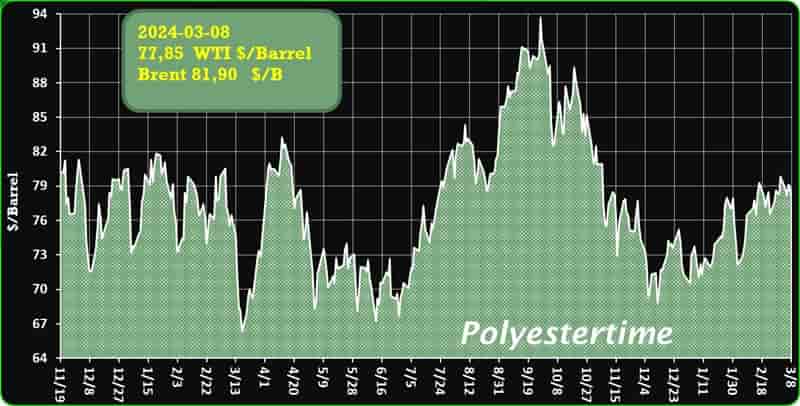
Crude Oil Prices Trend by Polyestertime
Nexam Chemical’s Reactive Recycling has been confirmed for the recycling of PP
Nexam Chemical has validated its Reactive Recycling technology for recycling polypropylene (PP), addressing the decrease in molecular weight during the rPP process. This advancement, crucial for polymer circularity, repairs degraded polymers, enhancing sustainability. Supported by extensive research, the additives restore molecular weight and improve processability, particularly benefiting high-demand engineering sectors. A study by Politecnico di Torino confirms the effectiveness of Nexam Chemical’s additive in preventing molecular weight decrease and enhancing melt structuring in PP.
Dr Alberto Frache highlights its potential for achieving recycled PP with modulable flow characteristics and improved processability, promoting sustainability and resource efficiency. Oxo-biodegradable Bottles
Marketed as Reactive Recycling, these additives are suitable for both post-industrial and post-consumer mechanical recycling, maintaining recycled PP quality and supporting the transition to a circular economy. CEO Ronnie Törnqvist sees this as a significant milestone, enabling increased use of rPP in processes previously reliant on virgin material, such as foaming and blow molding. This contribution underscores Nexam Chemical’s commitment to advancing the global plastics recycling industry.

Two recently uncovered substances with the ability to manipulate light
Two materials akin to graphene, rhenium disulfide and rhenium diselenide, have been uncovered by a research team led by Konstantin Novoselov, Nobel laureate in 2010 for graphene’s discovery, and Luis Martin-Moreno, from the University of Zaragoza, as published in Nature Communications. These materials, like graphene, consist of thin atomic layers, possessing unique properties that allow them to manipulate light-matter interaction in unprecedented ways. This breakthrough opens avenues for novel diagnostic techniques and heat-resistant materials, alongside potential applications in augmented reality devices. Oxo-biodegradable Bottles
Valentyn Volkov, a study co-author and co-founder of XPanceo, a start-up specializing in advanced contact lenses for augmented reality, highlighted the materials’ promise in developing highly efficient biochemical sensors. Moreover, the simplicity of their production suggests broad industrial applications. Volkov anticipates significant cost reductions in hospital blood analysis equipment, potentially by several orders of magnitude, which could revolutionize early-stage detection of diseases such as cancer or Covid.
These materials represent a leap forward in harnessing light-matter interaction for practical applications. Their discovery paves the way for transformative advancements in various industries, promising more accessible and effective solutions for healthcare diagnostics and beyond. Oxo-biodegradable Bottles
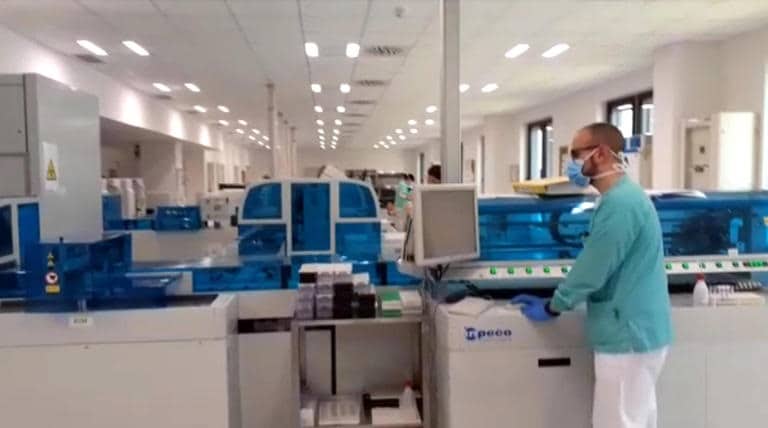
Analyzing the Advanced Recycling Sector
Research from nova-Institute investigates 127 technologies and the providers pushing advanced recycling forward.
- More than 340 advanced recycling plants are installed or in planning stages worldwide
- By 2027, Europe’s advanced recycling input capacity will more than triple, and global input capacity will double
- Dissolution, solvolysis, pyrolysis, gasification, and enzymolysis technologies and providers come into focus Oxo-biodegradable Bottles
An updated and expanded report on advanced recycling from nova-Institute, Hürth, Germany, explores technological advances, identifies key companies, and provides a view into the current state of advanced recycling in Europe and worldwide.
The report offers a structured overview of the advanced recycling landscape, defining the technologies and profiling providers of advanced recycling — particularly chemical recycling.
The report maps more than 340 planned and installed advanced recycling plants worldwide, with the majority in Europe; total input capacity is 1,477 kilotonnes/1,628 kilotons per year. Europe’s input capacity is expected to more than triple by 2027. Globally, input capacity is expected to double by 2027. Oxo-biodegradable Bottles
On the output side, global production capacity for advanced recycling is 1,082 kilotonnes/1,182 kilotons per year. Products include polymers, monomers, naphtha, secondary valuable chemicals, fuels, and energy.
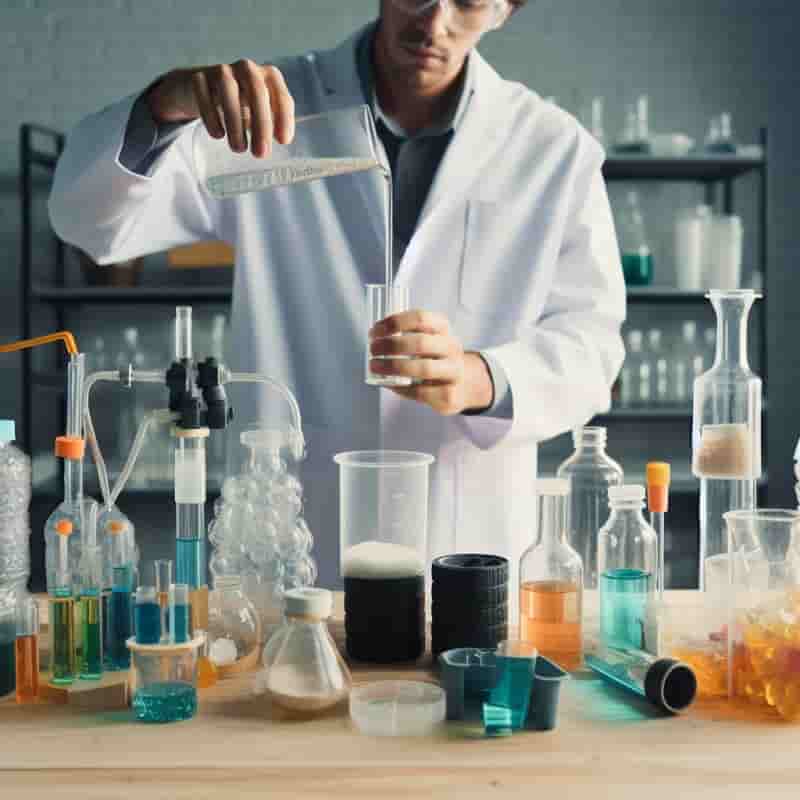
Regenyx chemical recycling joint venture dissolved
Agilyx and Americas Styrenics (AmSty) have successfully demonstrated the viability of depolymerizing styrenic waste, achieving the objectives set for their joint venture, Regenyx, founded in 2019 in Tigard, Oregon. Consequently, they have decided to dissolve the 50/50 partnership. The closure of Regenyx marks the culmination of its five-year mission.
The decision’s implications regarding future commercial plant construction remain unclear. AmSty currently markets polystyrene derived from post-consumer waste, branded as PolyRenew, showcasing identical characteristics and performance to virgin polystyrene.
Tim Barnette, AmSty’s vice president of polymers and sustainability, expresses pride in the project’s success, affirming advanced polystyrene recycling’s feasibility and significance for the future. Oxo-biodegradable Bottles
The Tigard demonstration plant, operating at a capacity of up to 10 tons per day, will cease operations by April 30, 2024, concurrent with the company’s liquidation. Over the five-year period, the venture has diverted 2,700 tonnes of styrenic-based plastic waste from landfills.
Russ Main, interim CEO of Agilyx, highlights the venture’s significance, noting its potential for future projects such as the upcoming Toyo Styrene plant in Japan. Additionally, Agilyx is engaged in the TruStyrenyx project with Ineos Styrolution, focused on establishing a chemical recycling plant for polystyrene waste through pyrolysis in Channahon, Illinois, USA. 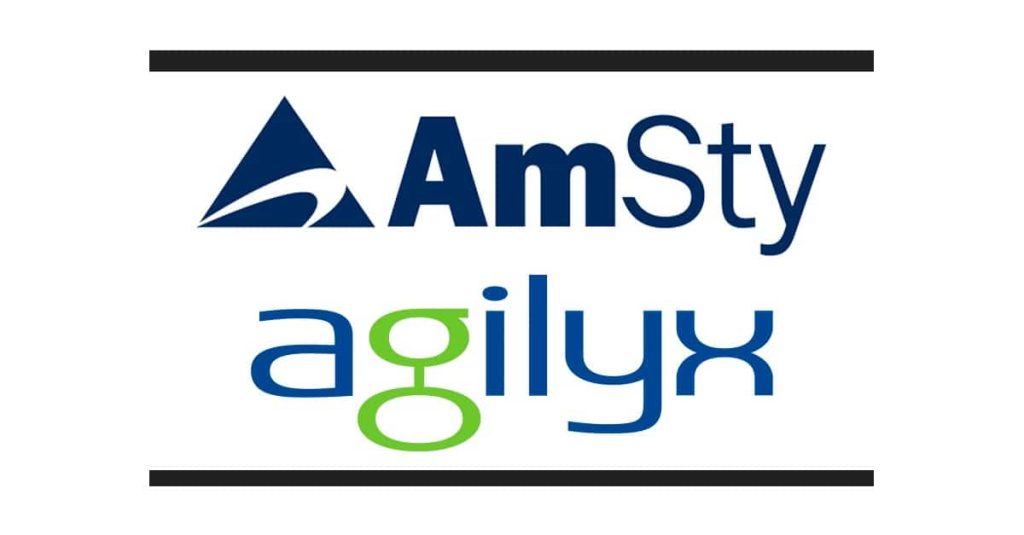
Planet Green Bottle Corp. is proud to unveil what it heralds as a groundbreaking innovation: the world’s premier oxo-biodegradable PET plastic bottle
In a series of meticulous presentations held in New York City, the company is showcasing this revolutionary product to esteemed brand owners and investment professionals.
This pioneering venture is made possible through a collaborative effort with Wells Plastics.
Patrick Rooney, the co-founder and director of corporate development at Planet Green, emphasizes the growing disdain towards plastic bottles among the public, driven by an increasing environmental consciousness. Oxo-biodegradable Bottles
Highlighting recent bans on plastic water bottles by institutions like the University of Washington and Winnipeg, Rooney expresses optimism that the public perception of plastic can be reshaped with the introduction of biodegradable alternatives. He underscores the minimal environmental impact of PET plastic production, citing that a mere 10 tablespoons of oil are utilized per average barrel, and extols the significant fuel savings achieved through PET bottles compared to glass alternatives.
The company’s innovative “revertable” or oxo-biodegradable bottle marks a pivotal shift in the industry. Oxo-biodegradable Bottles
Planet Green predicts that major beverage and water companies, which collectively distribute 75 percent of PET plastic bottles, will inevitably integrate oxo-biodegradability into their recycling strategies. Rooney reveals ongoing collaboration with one of these industry giants, indicating a proactive stance towards sustainability and environmental responsibility.
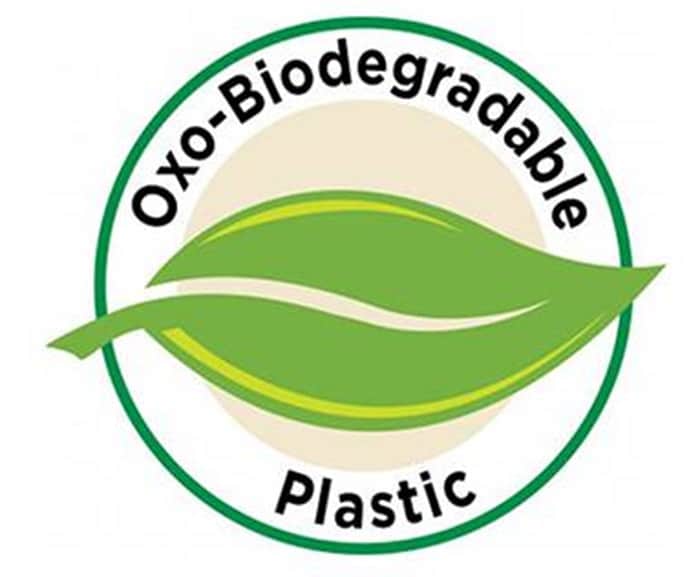
EuRIC, FEAD and NGOs back “polymer-only” allocation method for plastic from chemical recycling
In the coming weeks, the European Commission plans to adopt rules for calculating recycled content in plastics in an implementing decision of the Single-Use Plastics Directive (SUPD). Specifically, the Decision will govern how the use of output materials from chemical recycling in the production of new plastics is to be allocated and verified.
The Commission’s most recent draft discussed at the end of February would allow use of the “fuel-use-exempt” mass balance allocation model.
This model is favoured by the petrochemicals industry, but rejected by a coalition of industry associations and NGOs. Oxo-biodegradable Bottles
It consists of the European Waste Management Association (FEAD), the European Recycling Industries’ Confederation (EuRIC) as well as environmental groups such as Zero Waste Europe (ZWE), the European Environmental Bureau (EEB), the Environmental Coalition on Standards (ECOS) and the Minderoo Foundation as well as by the European Sustainable Business Federation Ecopreneur.
These organisations sent a joint letter to policy officers of the European Commission’s DG Environment last week urging them to consider amending the proposal’s allocation rules. They warned that a decision for the wrong methodology today would “have implications beyond its immediate scope”. Oxo-biodegradable Bottles
Current decisions were likely to shape future legislation such as the Packaging and Packaging Waste Regulation (PPWR), the Ecodesign for Sustainable Product Regulation (ESPR) and the End-of-life Vehicles (ELV) Regulation, they argued.
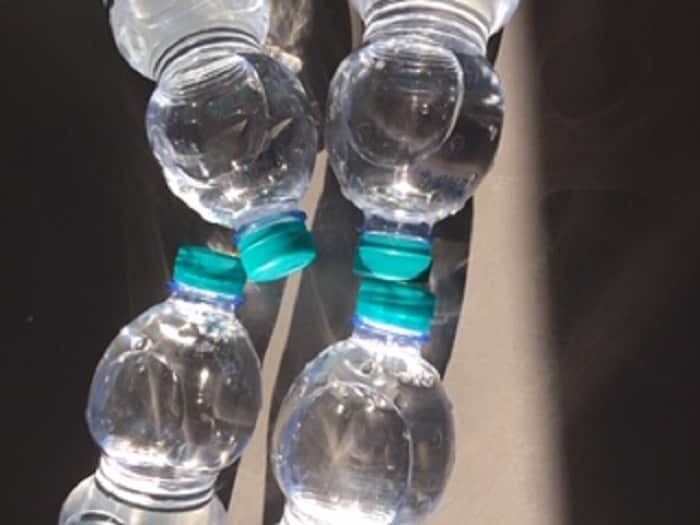
What’s new in Chemical Recycling Europe
Chemical Recycling Europe undergoes a significant transformation with a fresh logo and leadership shift. Lilla Mezriczky assumes the role of Director (Secretary General), steering the association dedicated to advancing chemical recycling of polymers in Europe. Founded in 2019, Chemical Recycling Europe collaborates with EU institutions and fosters relationships across the supply chain.
Simultaneously, the association unveils a revamped logo and a redesigned website (chemicalrecyclingeurope.eu). Oxo-biodegradable Bottles
Mezriczky brings a wealth of management expertise from her tenure at various associations including MedPharmPlast Europe, Epse, PCE, and EuPC.
Headquartered in Brussels, Chemical Recycling Europe boasts 23 members and is currently led by Carlos Monreal, founder and CEO of Plastic Energy. Under its new leadership and refreshed identity, the association is poised to drive innovation and advocacy for chemical recycling initiatives in Europe.
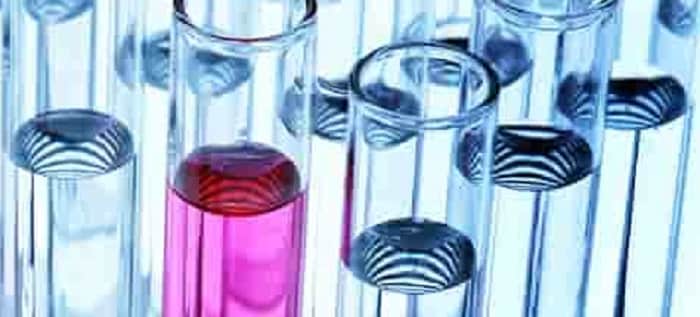
Oxo-biodegradable Bottles
